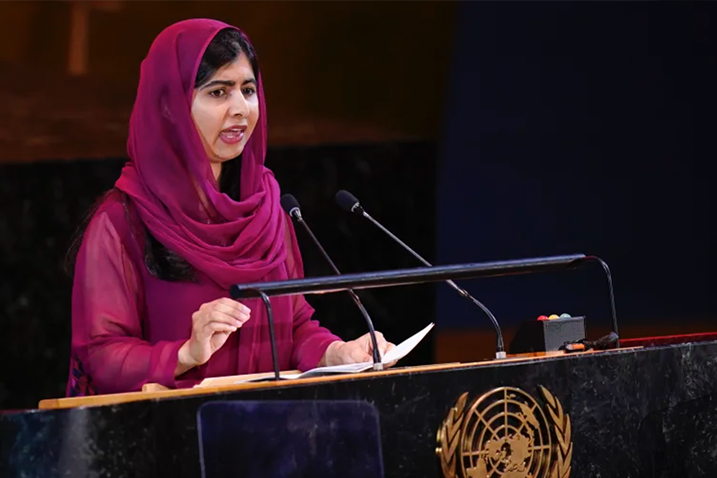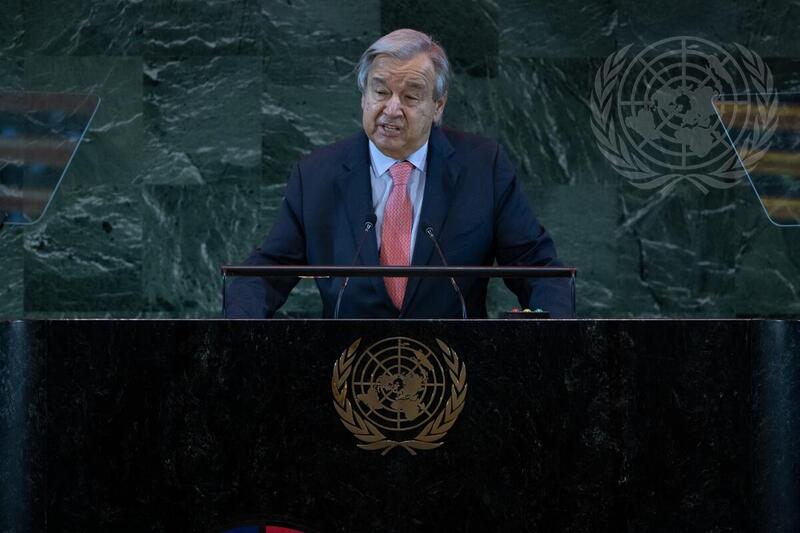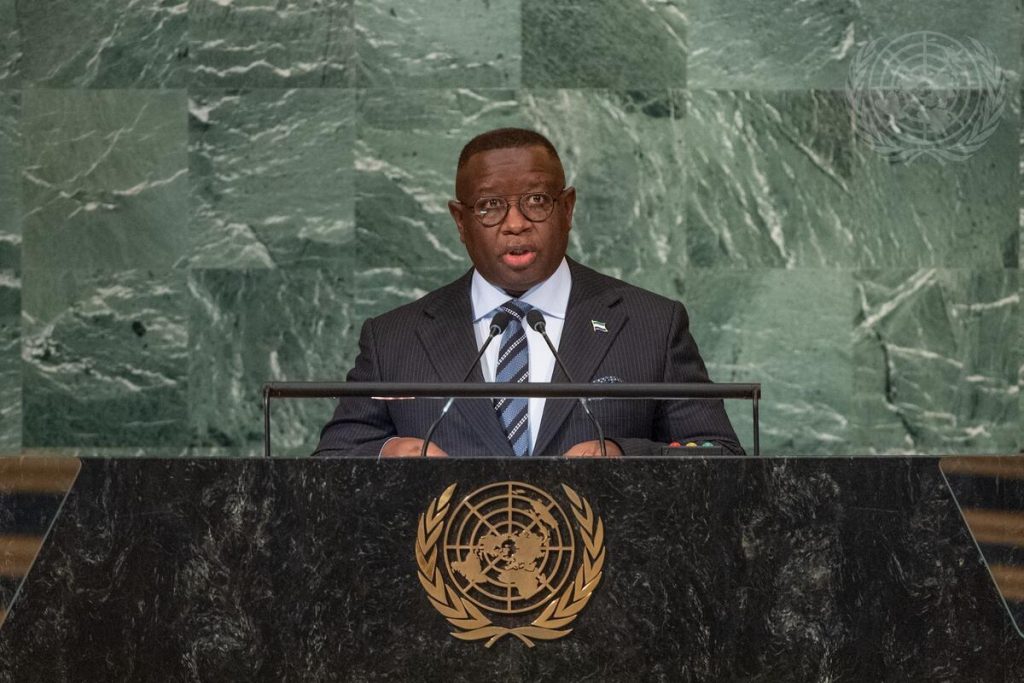“CHANGING THE LIVES OF CHILDREN MEANS, BEING SERIOUS ABOUT EDUCATION” – Malala Yousafzai

The education of children and young people (especially girls) was at the fore in the week that commenced the United Nations General Assembly Debate. Young and highly spirited advocates called on the 77th UN Assembly to take keen actions to improve education for girls in every area of the globe with regards to status, geographic location, religion, race and abilities.

Concurring with the opening speech by the United Nations Secretary General, António Guterres at the Transform Education Summit, there is an urgent need to transform education. That is, education that grants access to knowledge, skills and technology to all persons; education that teaches humanity to live in peace rather than wars and conflicts; education that protects the rights of all persons including the most vulnerable. Further emphasizing that the quality of education anywhere must also be protected and open to all without discrimination as he stated that “education transforms lives and societies, but we must transform education because it is in crisis”.
It is in crisis because not everyone has access to education and for those who do, with different levels of quality- widening the gap of inequality which the agenda 2030 seeks to bridge. Instances such as these were stated including that of Afghan girls who have been restricted from secondary education since September 2021 as the Secretary General asked that the ban be lifted to put life to the dreams of girls again.
Meanwhile in other instances where there are no bans on girls’ education like in Afghanistan, other factors seem to be putting the dreams of girls on hold and these include:
- Poverty
- Teenage Pregnancy
- Early marriages
- Unsafe school environments.
For some communities in Ghana, these are interwoven causes that are not allowing for the best out of education for girls because, the issue of poverty (as expressed by some teenage mothers) forces them out of school to either learn a trade or just drop out once the basic needs to help their education are not met. This leaves the girls exposed to different forms of harm including risky sexual behaviors, all in the name of survival.
Unsafe environments continue to force a lot of girls to consistently skip school as a result of poor hygiene facilities that inherently fosters an non-conducive atmosphere for their learning. With menstrual hygiene playing a critical role in this condition where girls must miss study hours to take care of their periods; for schools that either lack the facilities or are faced with unclean and undignified spaces to take care of the girls, this poses a long-term challenge. Aside this, some school environments have failed in the protection of girls against gender-based violence like harassment and rape among peculiar experiences. These are contributory reasons for the lower quality of education that are experienced by some girls confirming the 57% of children globally that cannot read simple texts according to the United Nations Educational, Scientific and Cultural Organization (UNESCO).
Even though some dropouts have happened as a result of the attitudes of the girls, a teacher in an interaction mentioned that the environment the girls are exposed to plays a crucial role in the choices they make. Living in an environment with rampant early marriages have influenced a lot of girls to choose the path they are most exposed to leaving their potentials untapped.
Representatives from the Ghana Education Campaign Coalition explained in a radio discussion the tasks that are laid on teachers in most remote areas to advocate for girls to be in school, in a bid to eliminate the instances of early marriages and other harmful practices because education cannot be taken out of the transformation society needs. Adding on, instances were outlined of the number of girls that are being rescued from child marriages with funds solicited to support their education because there is no way it can be left out of transforming the individual to affect the social environment. Girls left out of education means that a portion of the population has been left behind and poor performance due to the existing hindrances contradicts the efforts to attain Sustainable Development Goals 4 and 5.

The essence of the fourth goal cannot be underestimated as it affects all the other goals for the sustainable development of our society and the globe at large. It makes it important to reflect on the five suggestions made by the President of Sierra Leone who doubles as the Co- Chair of the SDG 4 High Level Steering Committee at the Transform Education Summit which encourages a shared commitment to the agenda.
Focus for shared commitment to transforming education.
- Inclusion.
- Quality
- Retention
- Conclusion
- Transition.
Reiterating the concerns that education must be open to all with its high quality, so that the potentials of young people are harnessed, with pregnancies and childbirth delayed on the part of vulnerable girls. To a large extent, girls are alleviated from poverty to have the cycle gradually broken when they are protected from these harmful practices with adequate exposure to formal education.
Retention in the schools takes a lot more effort than just admissions to curb the rate of dropouts especially in the Ghanaian communities (like those along the shores) where young girls can trade their education for labor at very earlier ages with little or no skills acquired for a secured future. This in the long run rather deepens the level of vulnerability when no particular skills are built with which there are very weak developmental foundations.
Again, sharing in the thought that education must be whole, girls anywhere must have equal access to the technological tools that are needed to make greater strides in STEM, an instance was cited in the UNESCO Global Report that in 50 of 54 countries, girls are less likely to get top marks in mathematics. With much progress made regarding access, the tools must be available as well to enable the development of more skills to effectively contribute to global growth then the needed transition from education to positive change is realized.
Transitioning from just learning and answering questions, education must translate into the relevant skills and knowledge to build up the entire globe with contributions from every society and girls like Malala Yousafzai, Vanessa Nakate, Somaya Faruqi and the likes raised everywhere to hold the fort in protecting the environment and protecting humanity.
The Key Areas from the SG to save education…
- Protect the rights of quality education for all; it is not a privilege.
- Teachers must be given adequate training because they are the lifeblood of education.
- Make schools safe spaces for the benefit of all
- There should be solidarity in financing against inequality; the creation of a global movement to protect the budget for quality education.
- Digital education must be a benefit to all.
Protect Girls, invest in quality education and transform society! #LetThemLearn.
Mavis Naa Korley Aryee, UNRAF Journalism Fellow.
